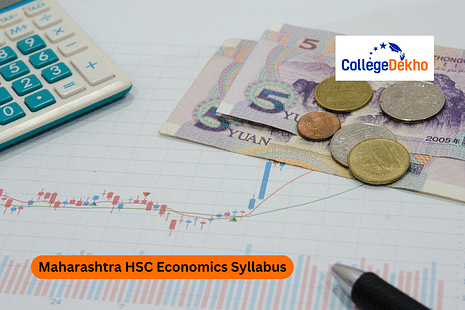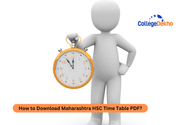- About Maharashtra HSC Economics Syllabus 2025-26
- Maharashtra HSC Economics Syllabus 2025- 26 Download PDF
- Maharashtra HSC Economics Syllabus 2025-26: Units
- Maharashtra HSC Economics Syllabus 2025-26 Internal Assessment
- Important Topics for Maharashtra HSC Economic Syllabus 2025-26
- Maharashtra HSC Economics Books 2025-26
- Faqs


Never Miss an Exam Update
About Maharashtra HSC Economics Syllabus 2025-26
Maharashtra State Board of Secondary And Higher Secondary Education uploads the syllabus on the official website to be checked by the students accordingly. The syllabus will consist of information about the units included in the curriculum. In Economics, the syllabus is divided into two parts. The theory paper in Economics will be conducted for 80 marks and the remaining marks will be provided for the practical session. In the practical exam, students will have to present an assignment according to the topics covered in the syllabus. Students need to study both microeconomics and macroeconomics to gain good marks in the results.
Students can also use Maharashtra HSC Economics Sample Paper 2025-26 to check the exam format and the commonly asked questions. To pass the board exams, students are required to get a minimum passing mark separately in both theory and practical exams. A minimum of 35% marks is required for the students to be considered a “Pass”. Check out more information about the Maharashtra HSC Economics Syllabus 2025- 26 here:
Also Read: Maharashtra HSC Economics Previous Year Question Paper
Maharashtra HSC Economics Syllabus 2025- 26 Download PDF
Students can refer to the PDF of the Maharashtra HSC Economics Syllabus 2025-26 from the table given below and download it to prepare for the exam:
Maharashtra HSC Economics Syllabus 2025-26: Units
Students can refer to the unit-wise Maharashtra HSC Economics Syllabus 2025-26 from the tables given below according to the different parts included in the curriculum:
Part A - Introductory Macroeconomics
Chapter | Topics |
|---|---|
National Income and Related Aggregates |
|
Money and Banking |
|
Determination of Income and Employment |
|
Government Budget and the Economy |
|
Balance of Payments |
|
Part B - Indian Economic Development
| Chapters | Topics |
|---|---|
Development Experience (1947-90) and Economic Reforms since 1991 |
|
Current Challenges facing the Indian Economy |
|
Development Experience of India |
|
Also Read: Maharashtra HSC Time Table 2025-26
Maharashtra HSC Economics Syllabus 2025-26 Internal Assessment
For the internal assignment, students can choose one of the given topics to prepare their assignment on:
- 1) Visit any cottage industry and collect information about its income and expenses.
- 2) Visit some families and note down observations regarding how the utility of different commodities is subjective and relative.
- 3) Prepare a chart for Marginal Utility and Total Utility of any commodity consumed by you.
- 4) Comparative study of individual demand schedules of any one commodity of two families.
- 5) Visit a grocery shop and collect information about changes in demand and changes in price of wheat for the period of 5 months.
- 6) Visit retailers of any commodity & collect information about prices & supply.
- 7) Collect information about prices charged for toothpaste, bathing soap etc. by different firms under monopolistic competition.
- 8) An interview with an entrepreneur.
- 9) An interview of skilled and unskilled labour engaged in different sectors.
- 10) Survey of people using credit cards & debit cards.
- 11) Visit any Commercial Bank & collect information about its functioning.
- 12) Collect information on different Banking instruments like cheques, demand drafts, etc.
- 13) Collect information about E-Banking
- 14) Collect information about changes in the policies of the Reserve Bank of India.
- 15) Collect information on the current budget from the newspaper.
Important Topics for Maharashtra HSC Economic Syllabus 2025-26
While preparing for the Maharashtra HSC Economics examination, students need to focus on the key topics. Prioritising and revising these important areas will enhance their understanding and increase their chances of scoring well in the exam. Students can refer to the table below to view the list of important topics covered in the HSC Maharashtra Economics syllabus.| Name of Topic | Weightage |
| Demand Analysis | 12 |
| Elasticity of Demand | 12 |
| National Income | 12 |
| Public Finance In India | 12 |
| Money Market and Capital Market | 11 |
| Index Numbers | 11 |
| Introduction To Micro And Macro Economics | 10 |
| Utility Analysis | 10 |
| Supply Analysis | 10 |
| Forms of Market | 10 |
| Foreign Trade In India | 06 |
Maharashtra HSC Economics Books 2025-26
NCERT is one of the most important books that you need to complete to get a grasp of the concepts. Check the list of the latest books and side-books from the pointers given below:
- ECONOMICS Std. TWELVE / Std. 12 (English Medium)
- Std 12 Economics Book | Eco | SYJC Commerce and Arts Guide | Smart Notes
- Std 12 Economics with Free Mini Master Pocket Book
- 12th Economics Book Maharashtra Board | SchoolChamp
- HSC Economics Notes & Paper Solution for Maharashtra State Board Students
- Introductory Macroeconomics- 12th Edition 2025-26
- Samashti Arthshastra Ek Parichey Textbook Of Economics 2025-26
- Std. 12 Master Key Economics (Mah. HSC Board)
Students need to understand the Maharashtra HSC Economics Syllabus 2025-26 in detail to start the preparations for the exam. The latest curriculum PDF is uploaded on the official website of the Maharashtra State Board of Secondary And Higher Secondary Education to be downloaded by the students accordingly.
Are you feeling lost and unsure about what career path to take after completing 12th standard?
Say goodbye to confusion and hello to a bright future!

FAQs
To download the Maharashtra HSC Economics Syllabus 2024-25, go to the official website of the Maharashtra Board of Secondary And Higher Secondary Education at mahahsscboard.org. Now, click on the SYLLABUS & SUBJECTS option to download the syllabus.
Students will have to make an assignment for the practical exams according to the Maharashtra HSC Economics Syllabus 2024-25. They can communicate with their teachers to learn more about the topics assigned for the current academic year.
Maharashtra State Board of Secondary And Higher Secondary Education has released the Maharashtra HSC Economics Syllabus 2024-25 in English however students can take the help of their teachers to obtain the syllabus in their regional language.
Students can download the Maharashtra HSC Economics Syllabus 2024-25 by visiting the official website of the Maharashtra Board of Secondary And Higher Secondary Education. Students can buy NCERT to complete their syllabus on time.
Maharashtra HSC Economics Syllabus 2024-25 is divided into two parts. Students will have to study Microeconomics and Macroeconomics in detail to appear for the exam. Both parts will have a weightage of 40 marks.
Was this article helpful?























